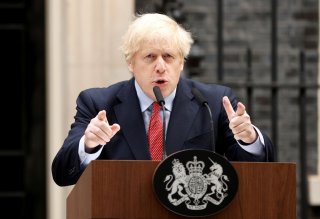Why We Need Everybody to Make an Extra Effort to 'Get Ahead' of the Coronavirus
Britain is moving from defensive to offensive: getting ahead of the virus.
On March 17, before he became ill with coronavirus, the UK prime minister, Boris Johnson, declared: “We are engaged in a war against the disease which we have to win.”
Six days later Johnson announced the lockdown – a defensive manoeuvre, unprecedented in modern times. Britons withdrew into their homes to shelter from the invisible enemy while casualties mounted and were conveyed to hospitals for treatment.
A month on, as infections have peaked and attention has switched to how the UK emerges from lockdown, a new narrative is emerging. Britain is moving from defensive to offensive: getting ahead of the virus.
As England’s chief medical officer, Chris Whitty, has said, people will have to learn to live with this virus. It is not going away, and it will be many months before we have a safe, effective vaccine, available to all.
In the meantime, people pick up their old lives and move into a new normality. There will be a constant risk of new outbreaks and the government must be ready to prevent them rapidly and robustly.
As the lockdown is eased, some physical distancing will be needed. The reopening of businesses and institutions will be phased. Restrictions on movement may be required from time to time and there may also be a need to limit crowding on public transport, including through staggering working hours.
Unseen occupying force
People everywhere are starting to appreciate that a viable future means treating the virus like an unseen occupying force. COVID-19 resistance must be created, mobilising an army of virus hunters to subvert and disable it. If this is done well, the UK will arrive at a new normal quickly and minimise the suffering caused by the shutdown of the economy.
The key elements of the resistance will be testing, contact tracing and isolation. Everyone with symptoms of the virus should be tested and their contacts (from two days before they displayed symptoms) traced and made to isolate. Technology can help here with a contact-tracing app that uses Bluetooth to record who has come within two metres of the user.
But many people, especially the vulnerable elderly, do not own smartphones or will not download and use the app – so they will need support.
Many hundreds of community-based COVID-19 virus trackers will be needed. They will be trained in basic principles of public health to find, interview and test contacts of those infected, by phone and in person. The better the contact tracing and isolation, the more likely the outbreak will be rapidly suppressed. The goal is to interrupt transmission as soon as it starts.
This is an epic struggle. At first, there may not be enough tests to confirm each diagnosis. The government will have to depend on those with COVID-19 symptoms isolating themselves immediately. This is a noble and selfless act and will be appreciated by all.
This calls for a huge effort by everyone. All health and social care workers need to be valued and protected. And people who are most at risk from the virus must be shielded and supported. Every citizen will be responsible for keeping the virus at bay, backed by widespread public health services and well-equipped hospitals.
This is a huge commitment by the people of the UK. It will deliver the best return of any investment made in response to the COVID-19 pandemic, both in terms both of the impact on the NHS and the economy.
Other countries have shown it can be done: keeping shops, restaurants and businesses open while being ready to act quickly and suppressing new outbreaks as they start.
This needs leadership that draws on the strengths that exist in communities, institutions, enterprises and governments, is inclusive of all and is guided by the best available science.
Above all, it involves people working together, whatever their beliefs and perspectives, understanding each other’s hopes and fears, comforting the needy and drawing on the extraordinary resilience of the human spirit.
![]()
Ara Darzi, Director of the Institute of Global Health Innovation, Imperial College London and David Nabarro, Co-Director of the Institute of Global Health Innovation, Imperial College London
This article is republished from The Conversation under a Creative Commons license. Read the original article.
Image: Reuters

